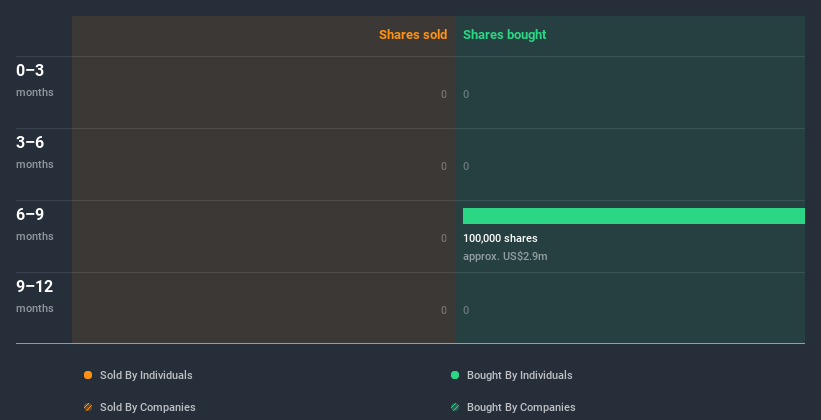- United States
- /
- Office REITs
- /
- NYSE:EQC
How Much Are Equity Commonwealth (NYSE:EQC) Insiders Spending On Buying Shares?

We often see insiders buying up shares in companies that perform well over the long term. On the other hand, we'd be remiss not to mention that insider sales have been known to precede tough periods for a business. So before you buy or sell Equity Commonwealth (NYSE:EQC), you may well want to know whether insiders have been buying or selling.
What Is Insider Buying?
Most investors know that it is quite permissible for company leaders, such as directors of the board, to buy and sell stock in the company. However, such insiders must disclose their trading activities, and not trade on inside information.
We would never suggest that investors should base their decisions solely on what the directors of a company have been doing. But logic dictates you should pay some attention to whether insiders are buying or selling shares. For example, a Columbia University study found that 'insiders are more likely to engage in open market purchases of their own company’s stock when the firm is about to reveal new agreements with customers and suppliers'.
Check out our latest analysis for Equity Commonwealth
Equity Commonwealth Insider Transactions Over The Last Year
Over the last year, we can see that the biggest insider purchase was by Independent Trustee Gerald Spector for US$2.9m worth of shares, at about US$28.84 per share. So it's clear an insider wanted to buy, even at a higher price than the current share price (being US$26.25). While their view may have changed since the purchase was made, this does at least suggest they have had confidence in the company's future. To us, it's very important to consider the price insiders pay for shares. As a general rule, we feel more positive about a stock when an insider has bought shares at above current prices, because that suggests they viewed the stock as good value, even at a higher price. Gerald Spector was the only individual insider to buy during the last year.
You can see the insider transactions (by companies and individuals) over the last year depicted in the chart below. By clicking on the graph below, you can see the precise details of each insider transaction!

There are always plenty of stocks that insiders are buying. So if that suits your style you could check each stock one by one or you could take a look at this free list of companies. (Hint: insiders have been buying them).
Insider Ownership of Equity Commonwealth
I like to look at how many shares insiders own in a company, to help inform my view of how aligned they are with insiders. A high insider ownership often makes company leadership more mindful of shareholder interests. Insiders own 2.0% of Equity Commonwealth shares, worth about US$64m. This level of insider ownership is good but just short of being particularly stand-out. It certainly does suggest a reasonable degree of alignment.
So What Do The Equity Commonwealth Insider Transactions Indicate?
The fact that there have been no Equity Commonwealth insider transactions recently certainly doesn't bother us. However, our analysis of transactions over the last year is heartening. Overall we don't see anything to make us think Equity Commonwealth insiders are doubting the company, and they do own shares. So while it's helpful to know what insiders are doing in terms of buying or selling, it's also helpful to know the risks that a particular company is facing. For instance, we've identified 2 warning signs for Equity Commonwealth (1 makes us a bit uncomfortable) you should be aware of.
If you would prefer to check out another company -- one with potentially superior financials -- then do not miss this free list of interesting companies, that have HIGH return on equity and low debt.
For the purposes of this article, insiders are those individuals who report their transactions to the relevant regulatory body. We currently account for open market transactions and private dispositions, but not derivative transactions.
When trading Equity Commonwealth or any other investment, use the platform considered by many to be the Professional's Gateway to the Worlds Market, Interactive Brokers. You get the lowest-cost* trading on stocks, options, futures, forex, bonds and funds worldwide from a single integrated account. Promoted
Valuation is complex, but we're here to simplify it.
Discover if Equity Commonwealth might be undervalued or overvalued with our detailed analysis, featuring fair value estimates, potential risks, dividends, insider trades, and its financial condition.
Access Free AnalysisThis article by Simply Wall St is general in nature. It does not constitute a recommendation to buy or sell any stock, and does not take account of your objectives, or your financial situation. We aim to bring you long-term focused analysis driven by fundamental data. Note that our analysis may not factor in the latest price-sensitive company announcements or qualitative material. Simply Wall St has no position in any stocks mentioned.
*Interactive Brokers Rated Lowest Cost Broker by StockBrokers.com Annual Online Review 2020
Have feedback on this article? Concerned about the content? Get in touch with us directly. Alternatively, email editorial-team@simplywallst.com.
About NYSE:EQC
Equity Commonwealth
Equity Commonwealth (NYSE: EQC) is a Chicago based, internally managed and self-advised real estate investment trust (REIT) with commercial office properties in the United States.
Flawless balance sheet and good value.
Similar Companies
Market Insights
Community Narratives




